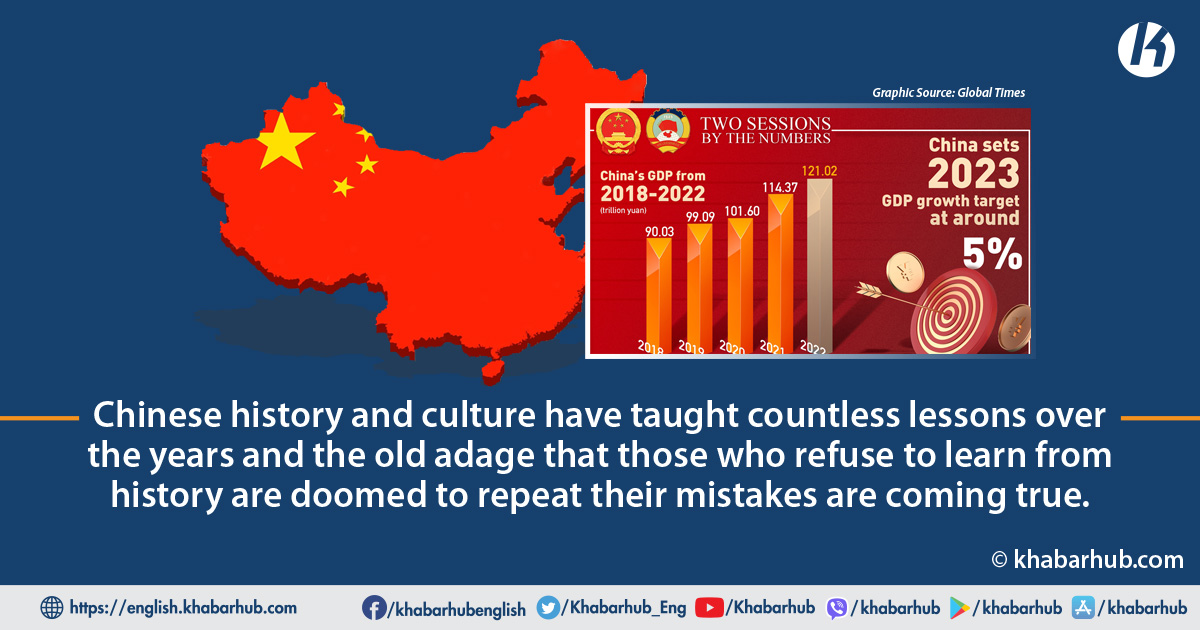With the official messaging coming out of the ‘Two Sessions’, the annual plenary sessions of the 14th National People’s Congress (NPC) and the Chinese People’s Political Consultative Conference (CPPCC), we can see various indicators of why the Chinese GDP is going to plummet in the coming years.
As we saw in 2022, China has set its GDP growth target at more than 5% and the claimed achievement has been around 3%.
Their internal work reports and achievements have never been more suspect than at the moment because, for the first time, China has taken back its own state policy of zero COVID and opened up the economy.
There have been several factors that have led to the current environment and it has become increasingly apparent that China is going to attempt to repeat its historical toolkit. Namely, that of accumulating foreign investment to prop up the economy until the reality matches the propaganda.
After three years of forcing people to stay indoors due to the state policy, we have seen several indicators of the real state of the economy such as the real estate crisis where Evergrande collapsed after years of uninhibited expansion.
In a normal economic scenario, such a situation would have never been allowed to happen and China was forced to bring out the riot police and water cannons in response to the defrauded people that it claims to serve.
With the ‘decoupling’ of the US economy from China and Europe looking to see to what extent China will support Russia in the Ukraine conflict, gaining foreign investment in such a scenario is a pipe dream.
However, if we ignore the official reports and only focus on what is happening with the Chinese people rather than what the government is reporting, we will be able to form a better picture of the human tragedy that is slowly going to unfold over the coming years.
The real state of the Chinese economy will have worrying consequences on the world stage. A significant point of concern has now become the debt traps that China has embedded in Africa where they are building substandard infrastructure projects and forcing governments to repay the loans despite the projects not being operational past their due dates of completion.
Perhaps due to a combination of COVID, corruption and the withdrawal of the West, China’s Belt and Road initiative is slowly sliding down into open banditry and coercion on the world stage rather than a juxtaposition of the West that it was supposed to be.
On the one hand, Chinese political goals for the coming year ensure that the focus will be on foreign investment, but the geopolitical realities ensure failure. China will inevitably antagonize the very countries it is seeking aid from.
The very fact that this balancing act exists ensures that China will never be able to meet its projected GDP growth rate.
For several years to come it will continue to falsify data and threaten the international community to maintain its charade as a relevant world superpower.
Internally, we have seen that it plans to solicit nearly $550 billion in the form of special local government bonds while at the same time increasing defense spending by nearly 7.2% to $225 billion in 2023.
The nature of these actions contradicts its official propaganda messaging on seeking ‘peaceful’ reunification with Taiwan. At the same time, vague messaging about ensuring self-reliance in the tech industry is another reason to believe that over the course of this year, control over the economic narrative will be more important than meaningful growth and investment.
Another area of concern is the way China is defaulting on its promises during COP27. The official story is that the authorities themselves are trying to crack down on carbon data fraud while encouraging further investment in wind and solar projects.
Provincial and state governments who implement these plans are actually massively stockpiling cheap Russian coal while the Ukraine conflict lasts.
This is a form of energy war profiteering and at the same time increasing China’s dependence on fossil fuels by opening thermal power plants to meet its own energy needs.
Another significant message emerging from the ‘Two Sessions’ is about China loudly refuting the growing concern about the workforce and the so-called ‘population dividend’.
While there have been no state interventions in this regard, there have been disturbing rumors about lowering the legal age of marriage because of the declining birth rate and the aging of the workforce.
Even the exaggerated internal statistics only showed around 9.5 million babies born in 2022. Young people are becoming increasingly disillusioned with the so-called “Chinese dream” of national rejuvenation.
We can see the hollow claims of the government stating that spending alone is enough to support the economy in the coming year.
The majority of voices among Chinese economists share the view that demographics will no longer continue to be a driver for economic growth.
There will be no stimulus for domestic demand as population contraction continues due to rising infections, medical debt and concerns over meeting societal expectations amidst a crisis-ridden economy.
Chinese history and culture have taught countless lessons over the years and the old adage that those who refuse to learn from history are doomed to repeat their mistakes are coming true.
In 1960, the authoritarian leader Mao pushed forward his agenda of the Great Leap Forward leading to 30 million deaths in the world’s largest preventable famine. Having consolidated power, Xi Jinping is poised to make the same mistake of pushing the economic agenda forward ignoring ground realities and hiding death tolls.
Perhaps the cyclical nature of history is inevitable wherein in the future we will see a Chinese politician rising to power in the wake of Xi’s death.
This will follow the same steps of wiping out traces of Xi’s thoughts while pushing their narrative center stage just as Xi Jinping did to Mao Zedong.
Leaving hollow spiritual figures while maintaining the party grip on power is a long-standing tradition among top officials in China.
The failure of the Chinese economy will start spiraling as zero-COVID is lifted and politics will focus on reigniting the economy.
Lacking the background of capital investment and coupled with a devastated populace, the economic prospects of China are dim.
This is aided by a muzzled bureaucracy and the egoistic needs of an aging dictator desperately trying to establish a legacy.
Based on all these factors, how can we possibly see the 2023 GDP growth rate of 5% as anything other than wishful thinking and official propaganda?
The reality in the coming months will obviously be different from the pessimistic projections of this article as all parties involved try to prop up something to prevent a global depression while trying to weaken China’s role in the global economy.
Sadly, the current geopolitical landscape makes it almost impossible for any of the major powers to focus effectively on climate change which will make it more difficult for economies to develop sustainable models of growth while increasing energy independence.
However, if we ignore the official reports and only focus on what is happening with the Chinese people rather than what the government is reporting, we will be able to form a better picture of the human tragedy that is slowly going to unfold over the coming years.
Reminiscent of the sixties, China is reverting to a time where villagers would sing jingles such as “Flatter shamelessly, eat delicacies.
Don’t flatter, starve to death for sure.” Having learned from Mao’s lessons, we see that while Xi is consolidating power, the scapegoat-in-chief will always be the Premier.
Li Qiang’d survival ultimately depends on how well he implements Xi’s policies while taking the blame for any mistakes that happen during his tenure.
Another tried and tested method in the Party toolkit during times of crisis has always been the shifting of blame to external ‘enemies’.
The more we see Xi Jinping failing to implement his policies effectively, we have to be of international saber rattling particularly when it comes to Taiwan, cooperation with Russia, or competition when it comes to scrambling for energy resources.
Sadly, the current geopolitical landscape makes it almost impossible for any of the major powers to focus effectively on climate change which will make it more difficult for economies to develop sustainable models of growth while increasing energy independence.









Comment